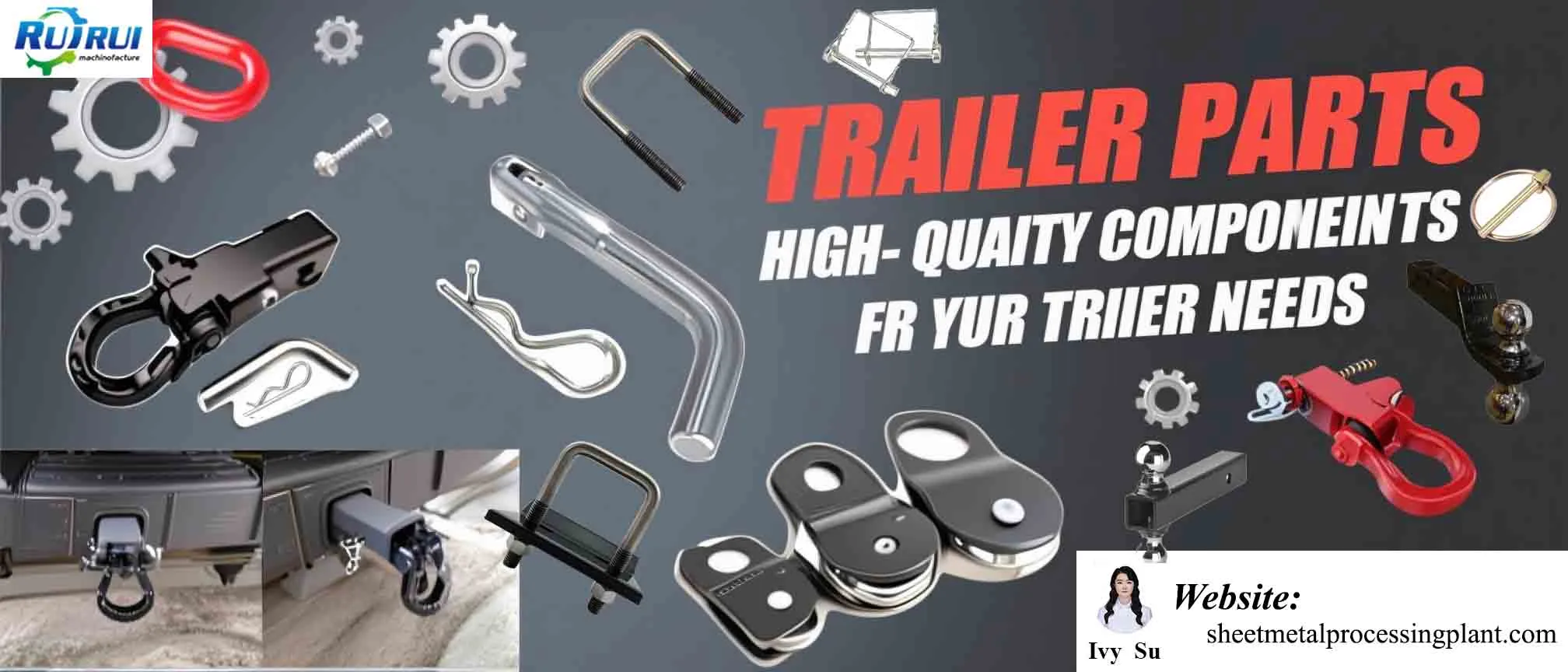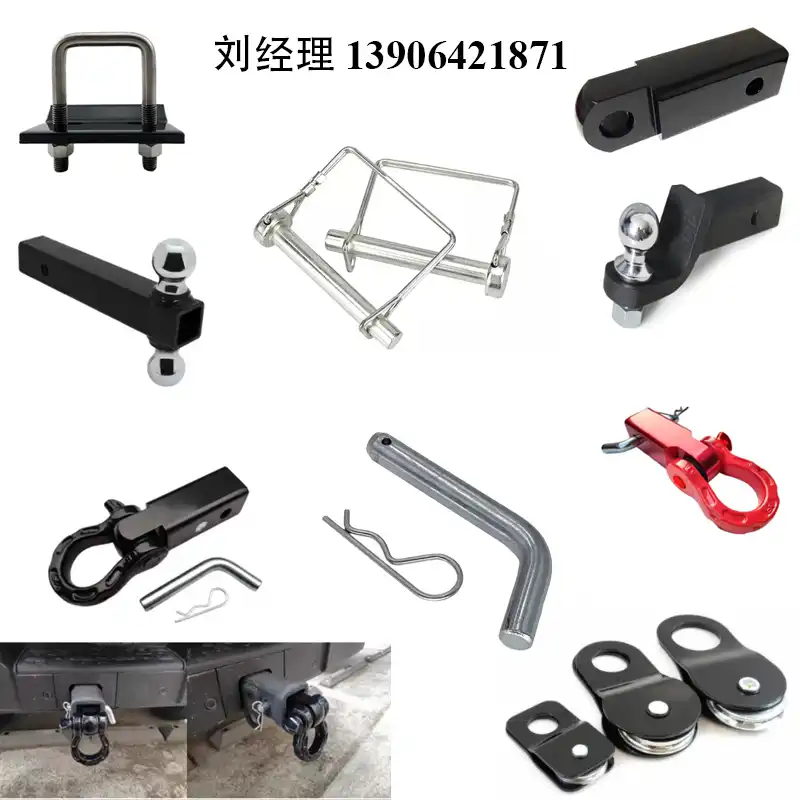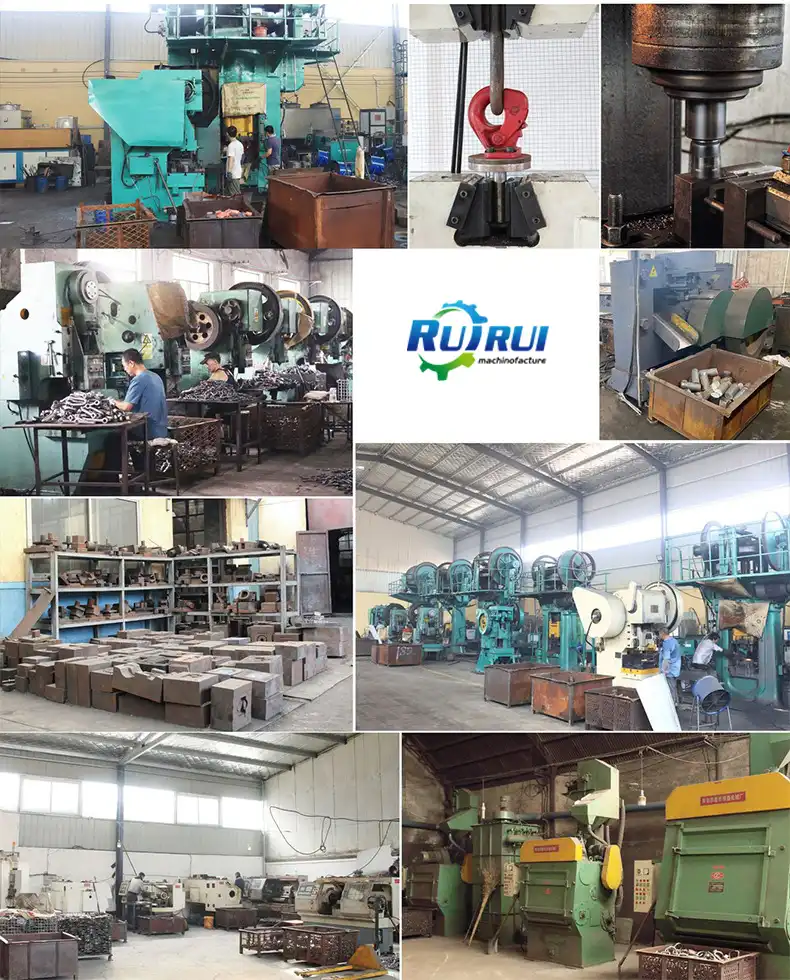Quick-Install Hitch Tightener: The Easiest Way to Eliminate Hitch Rattle
2025-11-06 15:19:06
Every driver towing a trailer knows the frustrating sound of metal clanging against metal as they navigate down the highway. That persistent rattling noise from your trailer hitch connection isn't just annoying—it signals excessive movement that can damage your vehicle's receiver tube and compromise towing safety. The Quick-Install Hitch Tightener provides an immediate solution to this widespread problem, securing your hitch connection within minutes and delivering the quiet, stable towing experience you deserve.

Understanding Hitch Rattle and Its Impact
Hitch rattle occurs when there's excessive clearance between the ball mount shank and the receiver tube opening. This manufacturing tolerance, typically ranging from 0.125 to 0.25 inches, allows for easy installation but creates unwanted movement during operation. Every bump, acceleration, and turn causes the metal components to collide, producing that characteristic clanking sound that drivers find so irritating. Beyond the noise annoyance, persistent hitch rattle accelerates wear on both the receiver tube and ball mount shank. The repeated metal-on-metal contact creates microscopic surface damage that compounds over time, eventually enlarging the gap and worsening the problem. This mechanical wear can compromise the structural integrity of your towing system, potentially leading to dangerous situations during highway travel or when maneuvering heavy loads.
-
The Hidden Costs of Ignoring Hitch Movement
Many trailer owners underestimate the long-term consequences of allowing their Hitch Tightener needs to go unaddressed. The continuous vibration transfers throughout your vehicle's frame, potentially loosening bolts and fasteners in surrounding areas. Electrical connections for trailer lights become unreliable as the constant movement disrupts wiring harnesses. Additionally, the excessive play in your hitch connection reduces your control precision when backing up or navigating tight spaces. Professional fleet operators recognize these risks and implement preventive measures immediately. Commercial applications cannot afford the downtime associated with damaged receiver tubes or the liability concerns stemming from compromised towing connections. The investment in a quality Trailer Hitch Tightener pays for itself many times over through extended component lifespan and enhanced operational safety.
Why Quick-Install Design Matters?
Traditional anti-rattle solutions often require extensive tool collections and mechanical expertise to install properly. Threaded bolt systems demand precise torque specifications, while complex bracket assemblies involve multiple components that can be challenging to align correctly. These complications discourage regular maintenance and leave many drivers operating with loose, noisy hitch connections rather than dealing with installation frustration. The Quick-Install Hitch Tightener revolutionizes this experience through intelligent engineering that prioritizes user accessibility. Modern clamp-style mechanisms allow single-handed operation, with lever-action designs that apply optimal pressure without requiring wrenches or socket sets. This tool-free approach means you can secure your hitch connection in parking lots, at boat launches, or anywhere else without needing to carry specialized equipment.
-
Engineering Features That Simplify Installation
Advanced Trailer Hitch Tightener designs incorporate several key features that streamline the installation process. U-bolt configurations slide easily over standard receiver tubes, while adjustment plates accommodate the natural manufacturing variations found in different hitch components. Spring-loaded pressure mechanisms maintain consistent clamping force even as components experience thermal expansion and contraction during operation. Quality manufacturers like Qingdao RUIRUI Machinery engineer their Quick-Install Hitch Tightener products with user experience as a primary design criterion. The components feature intuitive alignment guides that ensure correct positioning, while corrosion-resistant hardware eliminates the seized-bolt problems that plague inferior products. These thoughtful details transform hitch stabilization from a challenging maintenance task into a simple routine procedure.

Material Selection and Durability Standards
The effectiveness of any Hitch Tightener depends fundamentally on material quality and manufacturing precision. Grade 8 steel provides the optimal balance of strength and flexibility for this application, offering yield strength ratings that exceed the forces encountered during normal towing operations. This high-grade material resists deformation under load while maintaining the ductility necessary to absorb shock impacts without brittle fracture. Surface treatment technologies significantly extend component service life in challenging environments. Electroplating processes create protective barriers against moisture intrusion, while powder coating applications provide both corrosion resistance and UV stability. Advanced Dacro coating systems offer superior performance in marine applications and regions where road salt exposure presents accelerated corrosion challenges.
-
Customization for Specific Applications
Professional-grade manufacturers recognize that different towing applications demand specific engineering solutions. Heavy-duty commercial operations require reinforced construction that can withstand constant use and maximum tongue weight conditions. Recreational users prioritize lightweight designs that don't add unnecessary weight to their vehicle setup while still delivering reliable anti-rattle performance. Qingdao RUIRUI Machinery specializes in customizable Trailer Hitch Tightener solutions that address these diverse requirements. Their engineering team works directly with clients to specify appropriate materials, coating systems, and dimensional parameters for particular use cases. This flexibility ensures optimal performance whether you're securing a landscaping trailer for daily commercial use or stabilizing a boat trailer for weekend recreation.
Installation Process and Best Practices
Proper installation maximizes the effectiveness of your Quick-Install Hitch Tightener while ensuring long-term reliability. Begin by thoroughly cleaning both the receiver tube and ball mount shank, removing any accumulated dirt, rust, or debris that could interfere with proper seating. Inspect these components for significant wear patterns or damage that might require replacement before proceeding with stabilizer installation. Position the tightener assembly over the ball mount shank so that clamping surfaces contact both the receiver tube and shank simultaneously. For U-bolt style designs, ensure the bolt passes completely through the receiver opening before installing the pressure plate. Tighten the mechanism gradually, checking for even pressure distribution and confirming that the ball mount remains properly aligned within the receiver tube.
-
Maintenance and Adjustment Recommendations
Even the highest-quality Hitch Tightener requires periodic maintenance to sustain peak performance. Inspect mounting hardware monthly for signs of loosening, corrosion, or mechanical damage. Clean all surfaces regularly to prevent the buildup of road salt, mud, or other contaminants that can accelerate component deterioration. Apply appropriate lubricants to threaded fasteners and moving parts according to manufacturer specifications. Adjustment requirements vary based on usage patterns and environmental conditions. Commercial operators towing daily may need to check and adjust their systems weekly, while recreational users might perform these inspections seasonally. The key is establishing a consistent maintenance schedule that prevents small issues from developing into major problems requiring component replacement.
Vibration Dampening Technology Explained
Modern Quick-Install Hitch Tightener designs incorporate sophisticated vibration control principles derived from automotive engineering research. The strategic application of clamping force creates friction interfaces that dissipate kinetic energy rather than transmitting it throughout the vehicle structure. This mechanical dampening effect significantly reduces the amplitude of vibrations generated during towing operations. Material selection plays a crucial role in vibration control effectiveness. Steel components provide the structural strength necessary to maintain clamping pressure under dynamic loading conditions. Some advanced designs integrate polymer elements at critical interface points, where their viscoelastic properties absorb high-frequency vibrations that metal-to-metal contact alone cannot eliminate. This hybrid approach delivers superior noise reduction compared to traditional all-metal designs.
-
Impact on Overall Towing Experience
The benefits of effective vibration control extend beyond simple noise reduction. Reduced vibration transmission improves driver comfort during extended towing sessions, minimizing fatigue on long highway journeys. Passengers notice the difference immediately, with conversation and entertainment systems no longer competing with persistent clanking sounds from the rear of the vehicle. Vehicle systems also benefit from improved vibration isolation. Electrical connections maintain better contact integrity when not subjected to constant mechanical disturbance. Sensitive electronic components in modern vehicles perform more reliably when protected from the harsh vibration environment created by loose hitch connections. These secondary benefits justify the investment in quality Trailer Hitch Tightener solutions even beyond the immediate noise reduction advantages.

Compliance Standards and Safety Certifications
Professional-grade Quick-Install Hitch Tightener products meet rigorous industry standards that verify their performance and safety characteristics. ISO 4032 certification ensures that fastener components conform to internationally recognized specifications for dimensions, mechanical properties, and material composition. This standardization guarantees compatibility with equipment from multiple manufacturers while providing assurance of consistent quality. Transportation safety regulations, including DOT FMVSS 121 compliance, establish minimum performance requirements for trailer coupling systems and related accessories. Products bearing these certifications have undergone extensive testing to verify their ability to maintain secure connections under the demanding conditions encountered during commercial transportation operations. These regulatory standards protect both individual operators and the general public from the consequences of equipment failure.
-
Quality Control in Manufacturing
Qingdao RUIRUI Machinery implements comprehensive quality assurance protocols throughout their production process. Incoming material inspection verifies that raw materials meet specified grades and compositions before entering manufacturing operations. In-process monitoring catches dimensional variations and surface defects during production, preventing defective components from advancing to subsequent stages. Final testing procedures subject completed assemblies to load testing, corrosion resistance evaluation, and functional verification before shipment approval. This multi-stage quality control approach, supported by ISO 9001 certification, ensures that every Hitch Tightener leaving the facility meets or exceeds published performance specifications. Detailed quality documentation accompanies each production batch, providing traceability and supporting continuous improvement initiatives.
Comparing Installation Methods Across Product Types
The hitch stabilization market offers several distinct product categories, each with specific installation requirements and performance characteristics. Bolt-through designs utilize threaded fasteners that pass completely through the receiver tube, providing maximum clamping force but requiring tools and precise torque application. Clamp-style systems offer tool-free installation through lever-action mechanisms, trading some ultimate clamping force for significantly improved user convenience. Pin-style anti-rattle devices replace standard hitch pins with specialized designs incorporating wedge mechanisms or expandable elements. These products provide moderate rattle reduction with minimal installation complexity but may not address severe clearance issues as effectively as dedicated clamp systems. Understanding these design trade-offs helps operators select the most appropriate Quick-Install Hitch Tightener for their specific application requirements.
-
Performance Expectations by Design Type
Heavy commercial applications typically benefit most from bolt-through designs that deliver maximum clamping force and vibration dampening capability. The additional installation complexity becomes acceptable given the severe operating conditions and safety-critical nature of commercial towing operations. These systems often incorporate redundant fastening mechanisms that maintain connection security even if primary components experience partial failure. Recreational users generally prefer clamp-style Quick-Install Hitch Tightener products that balance adequate performance with installation convenience. The ability to install, remove, and reinstall these systems quickly supports flexible vehicle usage patterns where the same vehicle alternates between towing and non-towing duty. Quality clamp designs from manufacturers like Qingdao RUIRUI Machinery deliver professional-level performance while maintaining the simplicity that recreational users demand.
Cost Analysis and Value Proposition
Initial investment in quality Trailer Hitch Tightener products represents a small fraction of total vehicle and trailer system costs while delivering disproportionate benefits. Entry-level products typically cost less than a single tank of fuel, while premium systems rarely exceed the price of basic vehicle maintenance services. This favorable cost-to-benefit ratio makes hitch stabilization one of the most cost-effective improvements available to towing operators. Long-term value calculation must account for extended component life resulting from reduced wear on receiver tubes and ball mounts. Replacement receiver tubes can cost several hundred dollars installed, while quality ball mounts represent significant investments that deserve protection from accelerated wear. The modest cost of a Quick-Install Hitch Tightener prevents these much larger expenditures while simultaneously improving operational comfort and safety.
-
Total Ownership Considerations
Professional fleet operators conduct comprehensive lifecycle cost analysis when evaluating towing equipment investments. These calculations include initial purchase price, installation labor, maintenance requirements, and expected service life under typical operating conditions. High-quality products from established manufacturers consistently demonstrate superior value through extended durability and reduced maintenance demands compared to budget alternatives. Qingdao RUIRUI Machinery's Quick-Install Hitch Tightener products reflect this total-cost-of-ownership philosophy through robust construction and corrosion-resistant finishes that maintain performance throughout extended service intervals. Their 12-month warranty coverage provides additional value assurance, while technical support services help customers optimize installation and maintenance procedures for maximum system longevity.
Conclusion
Quick-Install Hitch Tightener technology transforms trailer towing from a noisy, frustrating experience into smooth, quiet operation. Quality products eliminate dangerous hitch movement while protecting expensive components from accelerated wear.
Cooperate with Qingdao RUIRUI Machinery Co., LTD.
Qingdao RUIRUI Machinery Co., LTD. stands as your trusted China Quick-Install Hitch Tightener manufacturer, combining advanced manufacturing capabilities with comprehensive customization services. As a leading China Quick-Install Hitch Tightener supplier and China Quick-Install Hitch Tightener factory, we offer competitive Quick-Install Hitch Tightener prices on High Quality Quick-Install Hitch Tightener products. Our China Quick-Install Hitch Tightener wholesale programs serve distributors worldwide, with Quick-Install Hitch Tightener for sale through flexible MOQ options starting at 1000 pieces. Contact our experienced team at info@qdkshd.com to discuss your specific requirements and discover why leading companies trust RUIRUI for their trailer fastener needs.
References
1. Anderson, J. (2023). Trailer Hitch Systems: Engineering and Safety Standards. Society of Automotive Engineers.
2. Mitchell, R. & Thompson, K. (2022). Vibration Control in Towing Applications. International Journal of Vehicle Design.
3. Patterson, D. (2024). Material Selection for Automotive Fastener Systems. American Society of Mechanical Engineers.
4. Wilson, S. (2023). Commercial Fleet Maintenance Best Practices. Transportation Research Board.
Send Inquiry
You may like
